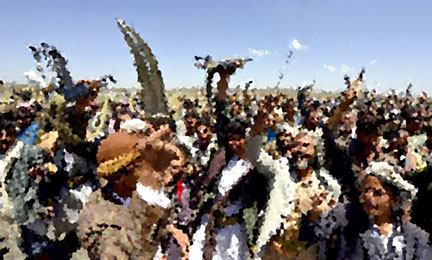
Are the Houthis a symptom of regional mistrust?
by Abdullah Hammidaddin, alarabiya.net, Saturday, 20 September 2014
Ten years ago this month Ali Saleh had ordered the field execution of Husayn al-Houthi. This was after a three-month war between government forces and Husayn’s supporters in a remote village in northern Yemen. At the time, Husayn’s supporters were few and I believe the matter could have ended there. But Saleh decided to push on and confront the rest of Husayn’s family who then reacted by picking up arms again. They ended up surviving five wars waged by the government. Today Abdulmalik al-Houthi – Husayn’s younger brother – has forces in Sanaa and this time he is threating the Yemeni government, forcing it to make concessions.
In the past year alone, the Houthis have altered the political landscape of Yemen. They pushed the Ahmar family out of their homes and overthrew their three hundred year sheikhdom and authority in the tribal federation of Hashid. They took the al-Jawf area as a strategic last stronghold for their adversaries. They’ve forged alliances with most tribes in the northern region and also in the south. And now in Sanaa they are fighting against both the militias of the Islah party (Muslim Brotherhood branch in Yemen) and military factions loyal to General Ali Muhsin Al-Ahmar in what could escalate into a major war in the fragile capital city.
This growth in power did not only stem from their bravado or local support. Hezbollah and Iran are allegedly supporting them, hoping to get a foothold in Yemen. This Houthi-Iran-Hezbollah triangle allows the Houthis to become potential springboard for Iranian activities directed against neighboring Gulf states.
Mistakes and victims
But another more important source for their growth was the mistakes of their adversaries. The Houthis are from the Hashemy clans in Yemen who trace their lineage back to the Prophet Mohammad and subsequently draw vast spiritual capital among Yemen’s population. And the father of Husayn was a well-known and respected scholar which gives them even more aura. The Houthis lived far away from urban areas preferring to be amongst the tribal villages around Saadah building strong relations in the process. Despite all that, with all the spiritual and social capital they had, the Houthis – 10 years ago – were barely able to solicit tribal support, and had narrow legitimacy amongst Zaydis, and limited Hashemy interest in their cause; even as the then President Saleh sent government forces to arrest and then kill Husayn.
But the government’s policy turned that around. First: Instead of focusing on a surgical operation against the small number of Houthis at the time, it unleashed its media against all Zaydis, and all Hashemys; pushing them in time to the Houthi camp under the motto: we are damned if we do and damned if we don’t; so we will do! Second: Instead of acting as a State and dealing with the Houthis as non-law abiding citizens; the government created tribal militias to fight alongside the army against the Houthis; and then it told those militias ‘you are fighting a religious war!’ Sectarian and ethnic rhetoric may have helped in mobilizing those militias but it empowered the Houthis like never before. Sympathy for them increased, and more of those sitting on the fence decided to jump in and join the fight. Such mistakes must be kept in mind today as policy makers think of how to confront them. Repeating them would only multiply their power and further destabilize Yemen.
Let’s trust each other
The Houthi threat must be taken seriously. Not only due to their Iran/Hezbollah alliance but also because no viable state in Yemen can exist in the presence of a militia that can paralyze the government. But this has to be done wisely. The mistakes of the past should not be repeated. Military confrontation will only produce innocent victims and almost no results on the ground. A media campaign against them will simply make the Houthi identity more radical. Statements from the U.N. Security Council condemning Houthi actions will simply embolden them and increase their local legitimacy. So what is a proposed solution?
The Houthis are a symptom of two collapses: the collapse of the state in Yemen after Saleh became president; and the collapse of the regional order after America’s invasion of Iraq. And the only way to solve the Houthi issue is to attend to those two. At the heart of building order is building trust. Today, Yemenis do not trust each other. They trust their guns. Regional countries do not trust each other and prefer to trust their military capacities. Any way forward has to start with a trust-building process. It will take years; but without trust, we will have no order, without order there is going to be a catastrophic human tragedy; one that has already began to unfold for some years now.
______
Abdullah Hamidaddin is a writer and commentator on religion, Middle Eastern societies and politics with a focus on Saudi Arabia and Yemen. He is currently a PhD candidate in King’s College London. He can be followed on Twitter: @amiq1